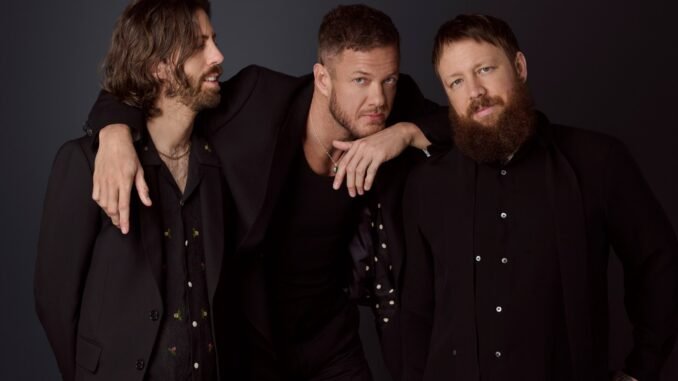
Dan Reynolds on Imagine Dragons’ Polarizing Reputation: ‘You Either Love It or You Hate It’…see more…
In the ever-shifting world of modern rock, few bands have managed to ignite as much passion — and criticism — as Imagine Dragons. Their signature blend of arena-sized anthems, pounding percussion, and introspective lyrics has garnered billions of streams and sold-out stadiums. Yet, for every fan who belts out “Believer” at full volume, there’s a detractor ready to call them overproduced or emotionally generic.
Frontman Dan Reynolds is fully aware of this dichotomy. In a recent interview promoting their upcoming compilation album Reflections (from the Vault of Smoke + Mirrors), Reynolds offered a frank and unapologetic take on the band’s place in pop culture: “You either love it or you hate it,” he said. “And honestly, I’m okay with that now.”
From Basement Beginnings to Global Domination
Imagine Dragons burst onto the mainstream music scene in 2012 with their debut album Night Visions, powered by the chart-topping single “Radioactive.” What followed was a streak of commercial success that few rock acts in the streaming era have matched. Tracks like “Demons,” “Thunder,” and “Whatever It Takes” became radio staples and digital juggernauts.
But along with their meteoric rise came an avalanche of criticism. Music reviewers often labeled the band’s sound as formulaic, pandering, or too polished. Online forums and social media users began mocking their style, making them an easy target for meme culture.
Reynolds admits that the early days of backlash caught him off guard. “When ‘Radioactive’ hit big, I was overwhelmed — not just by the success, but by how quickly people formed opinions,” he explained. “Some said it was the future of rock, others said we were killing it. At 25, that’s a lot to take in.”
Embracing the Hate
Rather than retreat or attempt to reshape the band’s identity to appease critics, Reynolds and his bandmates — Wayne Sermon, Ben McKee, and Daniel Platzman — leaned into what they do best: write emotionally raw, genre-blending songs designed to stir big feelings in big venues.
“There’s this assumption that we were trying to please everyone,” Reynolds said. “But Imagine Dragons has always been about personal catharsis. I write about my depression, my fears, my struggles with faith and fatherhood. If that resonates with someone, great. If it feels over-the-top to someone else, that’s fine too.”
Over time, Reynolds came to accept — even appreciate — the polarizing nature of their music. “I don’t think greatness or sincerity requires universal approval,” he said. “Some of my favorite artists were misunderstood in their prime. The people who truly connect with us, they connect deeply.”
An Evolving Sound
Despite their critics, the band has continued to evolve. Their last studio album, Mercury — Acts 1 & 2, produced by the late Rick Rubin, showcased a more stripped-down, vulnerable side of the group. While the bombastic choruses and layered instrumentation remained, tracks like “Wrecked” and “Lonely” dove into grief and isolation with haunting sincerity.
Reynolds sees the upcoming anniversary album, Reflections, as a chance to revisit an era that many fans feel didn’t get its due. “Smoke + Mirrors was an important record for us. It was darker, more experimental. Some of the songs on Reflections were written during that time but didn’t quite fit the mood. They deserved a spotlight.”
He also revealed that revisiting that material brought unexpected emotions. “I was going through a tough time back then — mentally and spiritually. Listening back, I hear the struggle but also the hope. It reminded me why I make music in the first place.”
Culture’s Love-Hate Relationship
The “love it or hate it” status of Imagine Dragons isn’t unique — many mainstream acts have faced similar fates. Bands like Nickelback, Coldplay, and even U2 have had to grapple with being both immensely popular and widely ridiculed.
What separates Imagine Dragons is the generational divide they seem to represent. For Gen Z and younger millennials, the band’s music served as a soundtrack to adolescence — a deeply felt, cathartic escape. For older listeners or those more attached to traditional rock, their sound feels synthetic or emotionally excessive.
“There’s definitely a cultural bias when something becomes really popular,” Reynolds noted. “It becomes cool to hate it. But at the end of the day, the connection we have with our fans is real. I meet people who say our music saved their life. That’s not something I take lightly.”
What’s Next?
As the band gears up for a new tour and releases Reflections, Reynolds says his focus is squarely on authenticity — not approval. “We’re not chasing trends. We’re not trying to change minds. We’re just continuing to tell our story.”
That story includes Reynolds’ own evolution. He has become an outspoken advocate for mental health, LGBTQ+ rights, and religious deconstruction. His non-profit, LOVELOUD, supports LGBTQ+ youth in conservative communities — a cause close to his heart given his Mormon upbringing.
“I want our band to stand for something more than just loud choruses,” he said. “If being vulnerable, passionate, and sometimes messy makes us a target — so be it. I’d rather be that than safe and forgettable.”
Final Notes
For Imagine Dragons, the paradox of public opinion may never fully resolve. They are too big to ignore, too sincere for irony, and too unconventional for purists. But for Dan Reynolds, that might just be the point.
“Art isn’t meant to be neat and tidy,” he said. “It’s meant to challenge, to comfort, to provoke. If we’re doing that, ev
en imperfectly — then we’re doing something right.”
Leave a Reply